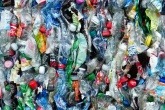WRAP publishes list of plastic items to be eliminated by end of 2020
Members of the UK Plastics Pact have committed to removing eight problematic or unnecessary single-use plastic items from shelves by the end of 2020 and have identified a further 19 items to take action against by 2025, though campaigners say the industry’s approach is “inadequate”.
The list of items was revealed yesterday (25 June) as the members of the Plastics Pact, which includes 76 businesses including Sainsbury’s, Tesco and Coca-Cola European Partners, continue to work towards the goals of the Plastics Pact.
 The members of the Pact, which was launched by the Waste and Resources Action Programme (WRAP) and the Ellen MacArthur Foundation (EMF) in April last year, are committed to achieving the following by 2025:
The members of the Pact, which was launched by the Waste and Resources Action Programme (WRAP) and the Ellen MacArthur Foundation (EMF) in April last year, are committed to achieving the following by 2025:
- Eliminating problematic or unnecessary single-use plastic packaging through redesign, innovation or alternative delivery models (such as reuse);
- 100 per cent of plastic packaging to be reusable, recyclable or compostable;
- 70 per cent of plastic packaging effectively recycled or composted; and
- 30 per cent average recycled content across all plastic packaging.
In pursuit of the first goal, eight items have been identified as needing to be removed from circulation by the end of 2020 ‘wherever possible’. These are disposable plastic cutlery, all polystyrene packaging, cotton buds with plastic stems, plastic stirrers, plastic straws, oxo-degradable plastics, PVC packaging and disposable plastic plates and bowls.
Beyond eliminating these items from the market, investigation is being undertaken into more items and materials, and members of the Plastics Pact are committed to developing and adopting solutions to these through reuse, redesign or smarter recycling by 2025. If issues surrounding these items or materials can be overcome, then they can remain in circulation. These items include plastic bags, plastic film packaging, bottle tops, single-use drinks bottles, disposable plastic cups and teabags.
As part of the lists of items published yesterday, WRAP also released its definition of the terms ‘problematic’ and ‘unnecessary’, which were put together by an action group of UK Plastics Pact members following a commitment to do so by April 2019 in the Plastics Pact Roadmap published last year. These terms have been defined as: ‘Single-use plastic items where consumption could be avoided through elimination, reuse or replacement and items that, post-consumption, commonly do not enter recycling and composting systems, or where they do, are not recycled due to their format, composition or size.’
Commenting on the lists of items, Peter Maddox, Director at WRAP, said: “We know that more people than ever are concerned about the impact of plastics. The fundamental way industry can support this public desire is by addressing the issues that lead to plastic packaging being problematic. So for every item of packaging we need to consider whether plastic is the right material choice, or indeed if packaging is required at all. In many cases, plastic may be the best material choice from an environmental perspective. In these cases, we need to ensure that the plastic can be and is recycled. The items listed today are priorities for UK Plastics Pact members, and the onus is on those members to implement changes, urgently.”
Actions ‘inadequate’
Public concern regarding plastics remains high and the government has made high-profile commitments to tackling the issue of plastic waste. In its Resources and Waste Strategy, published in December last year, the government stated that it would ban problematic plastic products where alternatives exist, though insisting that it wanted companies and consumers to lead on this rather than enforcing bans as it has done on microbeads and plastic drinking straws, stirrers and cotton buds.
However, this approach has been criticised by the Green Party, which believes problematic single-use plastics should be banned immediately, rather than waiting for businesses to make changes on a voluntary basis. Amelia Womack, Deputy Leader of the Green Party, said: “Companies produce and sell about 76 kilogrammes of plastic that goes to waste each year in the UK for every woman, man and child in the country.
“Today's response from industry and retailers is wholly, ridiculously, inadequate and doesn’t address public concern on plastics or effectively protect the environment. Again and again the model of self-regulation has failed. This is one more area in which the government needs to step in with strong action.”
“The Green Party is calling for a ban on all unnecessary single-use plastics. That would address almost all of the throwaway plastics on our high streets. It is up to the companies who sell products, and profit from them, to find alternative forms of distribution and packaging and take responsibility for the impact of their actions in our oceans, food chains and landscapes."
Lists of items
The eight items identified as needing to be removed from circulation are:
- Disposable plastic cutlery
- All polystyrene packaging
- Cotton buds with plastic stems
- Plastic stirrers
- Plastic straws
- Oxo-degradable plastics
- PVC packaging
- Disposable plastic plates and bowls
The further plastic items to be investigated are:
- Plastic bags
- Plastic film packaging (crisp packets)
- Multi-layer non-recyclable plastics
- Multi-pack rings for canned drinks
- Fruit and vegetable net bags
- Multi-buy bulk wrapping (multipack crisps packaging)
- PVC cling film
- Bottle tops and caps
- Single-use drinks bottles
- Non-recyclable coloured plastics
- Fruit and vegetable punnets
- Internal plastic trays
- Disposable plastic cups
- Fruit and vegetable stickers
- Plastic cup lids
- Plastic coffee pods
- Milk and salad dressing pots
- Tear-off tamper evidence strips on containers
- Teabags
You can read the full UK Plastics Pact Report, ‘Eliminating problem plastics’, on the WRAP website.










